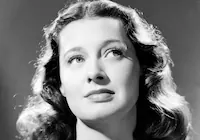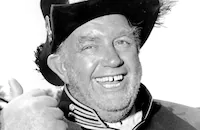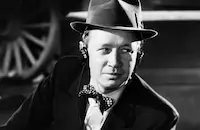Buck Benny Rides Again
Brief Synopsis
Cast & Crew
Mark Sandrich
Jack Benny
Ellen Drew
Eddie Anderson
Phil Harris
Dennis Day
Film Details
Technical Specs

Synopsis
Jack Benny resists the entreaties of bandleader Phil Harris to journey to Nevada, where Phil's sweetheart, Brenda Tracy, is waiting for her divorce, until Jack meets Joan Cameron, one of a trio of singing sisters. Believing that the only real men hail from the West, Joan spurns Jack's advances even though her sisters encourage the courtship. Realizing that Jack's infatuation presents the bait to lure him West, Phil tells Joan that Jack owns a ranch in Nevada, and when Fred Allen's press agent broadcasts the story, all of New York starts talking about Jack's ranch. To save face, Jack, determined to prove that he is a true son of the West, travels to Nevada. After Joan and her sisters arrive to perform at a nearby plush dude ranch, Jack poses as the owner of Andy Devine's spread. To impress Joan, Jack pays Andy's ranch hands to stage fights with him, but his plot backfires when he mistakes two real outlaws for Andy's patsies. Meanwhile, Joan overhears Rochester, Jack's butler, discussing Jack's ruse, and hires the outlaws to hold Jack up, but when she learns that Fred Allen's press agent is in town, she warns Jack. When the outlaws hold up the hotel, Jack, believing that the robbery is a fake, rushes to the rescue and, with the help of his pet bear Carmichael, captures the bandits and saves Joan.

Director

Mark Sandrich
Cast

Jack Benny

Ellen Drew

Eddie Anderson

Phil Harris

Dennis Day

Virginia Dale
Lillian Cornell
Theresa Harris
Kay Linaker

Ward Bond

Morris Ankrum

Charles Lane

James Burke
Merriel Abbott Dancers
Carmichael

Andy Devine
George Guhl
Billy Bletcher
Allen Wood
Monte Collins
Harry Baldwin
Three Martels & Mignon
Eddy Chandler
Dick Rich
Roger Gray
Willie Fung
Edgar Dearing
Ed Gargan

Eddie Acuff
Marty Faust
Sonny Chorre
George Walcott
Jean De Briac
Leyland Hodgson
George Melford
Buddy Roosevelt
Arthur Stuart Hull
Archie Twitchell
George Hickman
John Laird
Don Wilson
Max Wagner
Harvey Karels
Gene Clark
Rube Schaffer
Jerome De Nuccio
Sol Haines
George Bruggeman
George Barrows
James Notaro
Charles Teske
Bud Lawler
Bruce Cameron
Flash Gordon
Sam Karbin
Ed Rifkin
Dorothy Dayton
Paula De Cardo
Ernest Whitman
Crew
Roland Anderson
Edmund Beloin
Hans Dreier
Everett Freeman
A. E. Freudeman
Edith Head
Sam Hellman
Charles Henderson
Sig Herzig
Ben Holmes
Don Johnson
Charles Lang
William Lebaron
Frank Loesser
Eddie Mann
Jimmy Mchugh
Gene Merritt
Victor Milner
William Morrow
John H. Morse
Zion Myers
Leroy Prinz
Mark Sandrich
Leroy Stone
Arthur Stringer
Victor Young
Victor Young

Film Details
Technical Specs

Articles
Ellen Drew, 1914-2003
She was born Esther Loretta "Terry" Ray on November 23, 1914, in Kansas City, Missouri. The daughter of a barber, her family moved to Chicago when she was still an infant and she lived a very quiet childhood far removed from the glamour of Hollywood. She was encouraged by some friends to enter a beauty contest when she was just 17. After winning, she tried her luck in Hollywood, but found that they were no immediate offers for her particular talents.
She eventually took a waitressing job at C.C. Brown's, a famed Hollywood Boulevard soda fountain, and had virtually abandoned her dreams as a starlet when William Demarest, a popular actor's agent and well-known character actor, spotted her. Demarest arranged a screen test for her at Paramount, and she was promptly placed under contract for $50 a week.
For the first few years, (1936-38), Drew got only bit parts, and was often uncredited. When she finally got prominent billing in the Bing Crosby musical Sing You Sinners (1938), she decided to change her name, from Terry Ray to Ellen Drew. She earned her first major role in Frank Lloyd's If I Were King (1938) opposite Ronald Colman, yet for the most part of her career, rarely rose above "B" material and second leads. Still, she had some fine exceptions: Preston Sturges' enchanting comedy Christmas in July (1940), with Dick Powell; Tay Garnett's lighthearted war romp My Favorite Spy (1942) co-starring Kay Kyser; Julien Duvivier's taut The Imposter (1944), holding her own with a brooding Jean Gabin; and Mark Robson's chilling low-budget chiller Isle of the Dead (1945) opposite Boris Karloff. Drew made some notable television appearances in the late '50s including Perry Mason and The Barbara Stanwyck Show, before retiring from the entertainment industry. She is survived by her son David; five grandchildren; and five great-grandchildren.
by Michael T. Toole

Ellen Drew, 1914-2003
Quotes
Is it rainin' outside?- Rochester
No, Rochester, I was eating a grapefruit and it got out of control.- Jack Benny
Trivia
Notes
This film was based on the original, unpublished short story "Woman Handled" by Arthur Stringer. Before the credits roll, announcer Don Wilson introduces Jack Benny as "that rugged hero of the great outdoor-that strong silent sphinx of the prairie-that man among men where men are men." A Hollywood Reporter production chart credits Victor Milner with photography. The Merriel Abbott dancers perform an Indian adagio and acrobatic routines in the film. The film was shot on location at Victorville and Palm Springs, CA. Screenplay writers William Morrow and Edmund Beloin were also staff writers for Benny's radio program.














